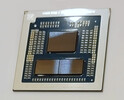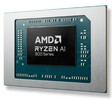AMD Ryzen 9 7840HX vs AMD Ryzen AI 9 HX 370 vs AMD Ryzen 9 7940HX
AMD Ryzen 9 7840HX
► remove from comparison
The AMD Ryzen 9 7840HX is a high-end notebook processorfrom the Dragon Range series with 12 cores and hyperthreading (SMT), which means it can process up to 24 threads simultaneously. The CPU uses the current Zen 4 architecture for the 12 cores and clocks these from 2.9 GHz (base clock) up to 5.1 GHz (single-core boost). The CPU offers 12 MB L2 cache and 64 MB L3 cache (i.e. a total of 76 MB cache). The 7840X consists of three chiplets, two CCD clusters with a maximum of 8 CPU cores in 5nm (71mm²) and one IO die in 6nm (122mm²) which are all manufactured at TSMC.
The performance of the Ryzen 9 should be significantly faster than the old Ryzen 9 6980HX (top model Rembrandt H, 8 cores, max 5 GHz). This is achieved by the additional cores, higher clock rate and improved architecture. Compared to the one year older Ryzen 9 7845HX, the 7840HX is clocked 100 MHz lower.
The chip also integrates 4x USB 3.2 Gen2 (10 Gbps) ports (no USB 4), 28 PCIe 5.0 lanes (for GPUs and SSDs), a dual-channel DDR5-5200 memory controller and a small AMD Radeon 610M graphics card (2CUs, 400 - 2200 MHz).
The R9 7840HX is specified with 55 watts TDP and can be configured from 45 to 75 watts (cTDP).
AMD Ryzen AI 9 HX 370
► remove from comparison
The AMD Ryzen AI 9 HX 370 is a powerful Strix Point family processor that debuted in June 2024. The APU comes with 12 CPU cores running at 2.0 GHz to 5.1 GHz, the 16 CU RDNA 3+ Radeon 890M graphics adapter and the 50 TOPS XDNA 2 neural engine. Other noteworthy features include PCIe 4, USB 4 and LPDDR5x-7500 RAM support.
Of the 12 CPU cores, 4 are full Zen 5 cores and 8 are smaller Zen 5c cores. The latter probably run at somewhat lower clock speeds than the former.
Architecture and Features
Strix Point family APUs are powered by Zen 5 and Zen 5c microarchitecture cores, the latter being a slightly slower, smaller and more energy-efficient version of the former. One of the differences between Zen 5 and Zen 5c is cache size; Zen 5 cores have larger caches to work with. According to AMD, Zen 5 delivers a 16% IPC improvement over Zen 4 thanks to branch prediction improvements and other refinements.
Elsewhere, the HX 370 supports LPDDR5x-7500 and DDR5-5600 RAM, and is natively compatible with USB 4 (and therefore Thunderbolt). It has PCIe 4.0 support for a throughput of 1.9 GB/s per lane, just like its 8000 series predecessors did. The integrated XDNA 2 NPU delivers up to 50 INT8 TOPS for accelerating various AI workloads.
Performance
Given the IPC improvement, we expect 4 Zen 5 cores combined with 8 Zen 5c cores to perform about as well as 16 Zen 4 cores meaning there is a real chance of the HX 370 dethroning the Ryzen 9 7945HX3D. We'll make sure to update this section once we get our hands on a laptop powered by the HX 370.
Graphics
The Radeon 890M is the most powerful iGPU that AMD has on offer right now. It features 16 RDNA 3+ architecture CUs (1024 unified shaders) running at up to 2,900 MHz. We expect the graphics adapter to deliver gaming performance good enough for playing 2023 and 2024 games in 1080p (Low detail settings).
Naturally, the 890M is capable of driving four SUHD 4320p60 monitors. It can also efficiently encode and decode the most popular video codecs including AVC, HEVC, VP9 and AV1. The latest addition to that list, the VVC codec, is not supported unlike it is with Intel Lunar Lake chips.
Power consumption
The HX 370 is supposed to have a base TDP of 28 W, with laptop makers free to crank it up to up to 54 W. Which they will most likely do to maximize performance.
The 4 nm TSMC process that the CPU cores are built with make for decent, as of mid 2024, energy efficiency.
AMD Ryzen 9 7940HX
► remove from comparison
The AMD Ryzen 9 7940HX is a high-end notebook processor from the Dragon Range series with 16 cores and hyperthreading (SMT), which means it can process up to 32 threads simultaneously. The CPU uses the current Zen 4 architecture for the 16 cores and clocks these from 2.4 GHz (base clock) up to 5.2 GHz (single-core boost). The CPU offers 16 MB L2 cache and 64 MB L3 cache (i.e. a total of 80 MB cache). The 7940HX consists of three chiplets, two CCD clusters with 8 CPU cores each in 5nm (71mm²) and one IO die in 6nm (122mm²) which are all manufactured at TSMC.
The performance of the Ryzen 9 should be comparable to a Core i9-13900HX (24 hybrid cores, max 5.4 GHz) in the top range of mobile processors from 2024. AMD itself advertises a clear lead over the old Ryzen 9 6900HX (8 Zen 3 cores, 4.9 GHz), which can be explained by the additional cores, improved architecture and higher frequencies. Compared to the top model, the Ryzen 9 7945HX, the 7940HX is slightly lower clocked.
The chip also integrates 4x USB 3.2 Gen2 (10 Gbps) ports (no USB 4), 28 PCIe 5.0 lanes (for GPUs and SSDs), a dual-channel DDR5-5200 memory controller and a small AMD Radeon 610M graphics card (2CUs, 400 - 2200 MHz).
The R9 7940HX is specified with 55 watts TDP and can be configured up to 75 watts (cTDP).
| Model | AMD Ryzen 9 7840HX | AMD Ryzen AI 9 HX 370 | AMD Ryzen 9 7940HX | ||||||||||||||||||||||||||||||||||||||||
| Series | AMD Dragon Range (Zen 4, Ryzen 7045) | AMD Strix Point (Zen 5/5c, Ryzen AI 3/5/7/9) | AMD Dragon Range (Zen 4, Ryzen 7045) | ||||||||||||||||||||||||||||||||||||||||
| Codename | Dragon Range-HX (Zen 4) | Strix Point-HX (Zen 5) | Dragon Range-HX (Zen 4) | ||||||||||||||||||||||||||||||||||||||||
| Series: Dragon Range (Zen 4, Ryzen 7045) Dragon Range-HX (Zen 4) |
|
| |||||||||||||||||||||||||||||||||||||||||
| Clock | 2900 - 5100 MHz | 2000 - 5100 MHz | 2400 - 5200 MHz | ||||||||||||||||||||||||||||||||||||||||
| L1 Cache | 768 KB | 1 MB | |||||||||||||||||||||||||||||||||||||||||
| L2 Cache | 12 MB | 16 MB | |||||||||||||||||||||||||||||||||||||||||
| L3 Cache | 64 MB | 36 MB | 64 MB | ||||||||||||||||||||||||||||||||||||||||
| Cores / Threads | 12 / 24 12 x 5.1 GHz AMD Zen 4 | 12 / 24 4 x 5.1 GHz AMD Zen 5 8 x AMD Zen 5c | 16 / 32 16 x 5.2 GHz AMD Zen 4 | ||||||||||||||||||||||||||||||||||||||||
| TDP | 55 Watt | 54 Watt | 55 Watt | ||||||||||||||||||||||||||||||||||||||||
| Transistors | 9900 Million | 9900 Million | |||||||||||||||||||||||||||||||||||||||||
| Technology | 5 nm | 4 nm | 5 nm | ||||||||||||||||||||||||||||||||||||||||
| max. Temp. | 100 °C | 100 °C | 100 °C | ||||||||||||||||||||||||||||||||||||||||
| Socket | FL1 | FP8 | FL1 | ||||||||||||||||||||||||||||||||||||||||
| Features | DDR5-5200 RAM, PCIe 5, MMX, SSE, SSE2, SSE3, SSSE3, SSE4A, SSE4.1, SSE4.2, AVX, AVX2, AVX-512, BMI2, ABM, FMA, ADX, SMEP, SMAP, SMT, CPB, AES-NI, RDRAND, RDSEED, SHA, SME | DDR5-5600/LPDDR5x-7500 RAM, PCIe 4, USB 4, XDNA 2 NPU (50 TOPS), SMT, AES, AVX, AVX2, AVX512, FMA3, MMX (+), SHA, SSE, SSE2, SSE3, SSSE3, SSE4.1, SSE4.2, SSE4A | DDR5-5200 RAM, PCIe 5, MMX, SSE, SSE2, SSE3, SSSE3, SSE4A, SSE4.1, SSE4.2, AVX, AVX2, AVX-512, BMI2, ABM, FMA, ADX, SMEP, SMAP, SMT, CPB, AES-NI, RDRAND, RDSEED, SHA, SME | ||||||||||||||||||||||||||||||||||||||||
| iGPU | AMD Radeon 610M (400 - 2200 MHz) | AMD Radeon 890M ( - 2900 MHz) | AMD Radeon 610M (400 - 2200 MHz) | ||||||||||||||||||||||||||||||||||||||||
| Architecture | x86 | x86 | x86 | ||||||||||||||||||||||||||||||||||||||||
| Announced | |||||||||||||||||||||||||||||||||||||||||||
| Manufacturer | www.amd.com | www.amd.com | www.amd.com |


 Deutsch
Deutsch English
English Español
Español Français
Français Italiano
Italiano Nederlands
Nederlands Polski
Polski Português
Português Русский
Русский Türkçe
Türkçe Svenska
Svenska Chinese
Chinese Magyar
Magyar
